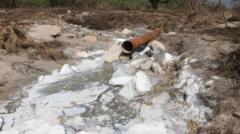Will Zambia Secure More Compensation from China for Toxic Mine Spill?

Published: 2025-09-11 15:36:06 | Category: world
Zambia's government is calling for further compensation for communities impacted by a significant toxic spill from a Chinese-owned copper mine, following a comprehensive assessment of the situation. In February, a dam at the Sino-Metals Leach Zambia mine collapsed, releasing heavy metal-laden acidic waste into a critical river source, jeopardising local drinking water supplies.
Last updated: 05 October 2023 (BST)
Key Takeaways
- A dam collapse at Sino-Metals Leach Zambia mine released toxic waste into a key river.
- The initial estimate of waste released was significantly lower than subsequent reports.
- Health risks from the spill include long-term organ damage and increased cancer risk.
- Zambia’s Vice-President emphasised the need for thorough assessments before further compensation is issued.
- Local communities report ongoing health issues linked to the pollution.
Understanding the Toxic Spill Incident
In February 2023, a catastrophic failure of a waste dam at the Sino-Metals Leach Zambia copper mine unleashed a torrent of acidic effluent into surrounding waterways. This incident has raised urgent concerns regarding environmental safety and public health, particularly as the affected river serves as a primary drinking water source for local communities.
The Initial Response and Fallout
Following the incident, Sino-Metals initially reported that approximately 50,000 tonnes of toxic waste had entered the river system. However, a subsequent investigation by Drizit, an environmental consultancy based in South Africa, revealed that the actual figure was an alarming 1.5 million tonnes. This staggering discrepancy has led to questions regarding the company's transparency and accountability.
Health and Environmental Concerns
The released materials contained high levels of hazardous substances, including cyanide, arsenic, copper, zinc, lead, chromium, and cadmium. These pollutants pose considerable risks, such as organ damage, birth defects, and potentially fatal illnesses like cancer. In response to the contamination, several embassies have advised their citizens to steer clear of the affected areas due to serious health hazards.
Government Actions and Community Impact
Zambia's Vice-President, Mutale Nalumango, has insisted that the safety of Zambians is "non-negotiable" and indicated that any compensation provided to the affected communities must be based on thorough assessments of the situation. While Sino-Metals has pledged to compensate victims, the Vice-President has stated that initial payments of £430,000 ($580,000) may not suffice if further assessments reveal more extensive damage.
Community Responses and Ongoing Health Issues
Despite the company's assurances, many local residents continue to suffer from health problems linked to the contamination, with reported symptoms including headaches, coughing, and gastrointestinal issues. Human Rights Watch (HRW) has highlighted the dire situation, noting that the pollution has devastated local agriculture, leading to the death of livestock and the destruction of crops, which has severely impacted farmers' livelihoods.
The Environmental and Economic Implications
Zambia is one of the world's top ten copper-producing countries, and its economy is heavily reliant on the mining sector. The repercussions of the toxic spill could have lasting implications not only for health and safety but also for the economic stability of communities dependent on agriculture and local resources. The government's response and the actions of Sino-Metals will be closely scrutinised as stakeholders seek to address the fallout from this environmental disaster.
International Responses and Concerns
International bodies, including various embassies, have issued alerts regarding the toxic spill. The Finnish government, for instance, reported that water samples from the area contained 24 different heavy metals, with 16 of these exceeding safety thresholds set by the World Health Organization. The US embassy has also withdrawn personnel from the affected region, citing concerns over widespread contamination.
What Happens Next?
Zambia's government has committed to pursuing additional compensation if assessments reveal more severe and lasting damage than initially understood. This commitment highlights the need for rigorous evaluation of both environmental and health impacts. Additionally, measures have been taken to mitigate the immediate effects of the spill, including imposing a fishing ban on the Kafue River and deploying lime to neutralise acidity levels in affected waters.
Conclusion
The toxic spill at the Sino-Metals Leach Zambia mine has underscored the critical need for increased scrutiny of mining operations and their environmental practices. As communities grapple with the health and economic impact of this disaster, it will be essential for the Zambian government and Sino-Metals to act transparently and responsibly. How the situation unfolds will likely determine the future of mining regulations and environmental safeguards in Zambia.
FAQs
What caused the toxic spill in Zambia?
The toxic spill was caused by the collapse of a waste dam at the Sino-Metals Leach Zambia copper mine, which released highly acidic waste into local waterways.
How much toxic waste was released?
Initial estimates reported 50,000 tonnes of waste, but subsequent investigations revealed that approximately 1.5 million tonnes of toxic material were released into the environment.
What are the health risks associated with the spill?
Health risks include long-term organ damage, birth defects, and increased cancer risk due to exposure to heavy metals like arsenic, lead, and cyanide found in the contaminated water.
What actions has the Zambian government taken?
The Zambian government has committed to pursuing further compensation for affected communities, imposed fishing bans, and deployed lime to mitigate environmental damage from the spill.
How has the international community responded?
International embassies have issued travel advisories and health alerts, with some advising their citizens to avoid the affected areas due to contamination concerns.



